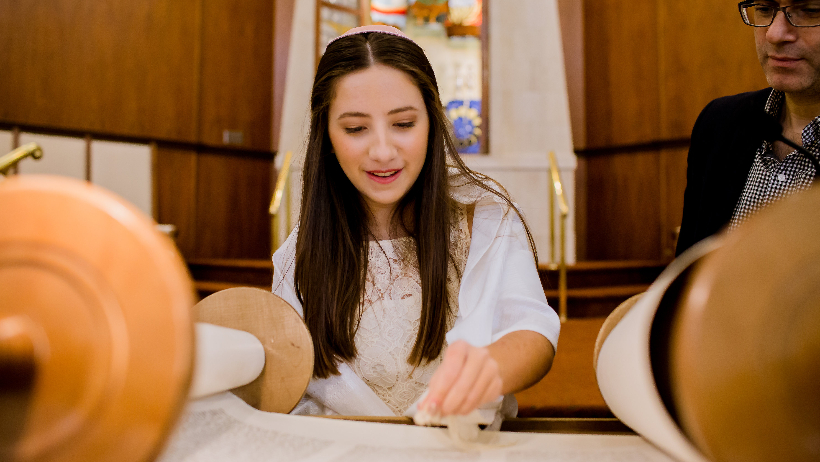Are you attending a bar or bat mitzvah?
If you’ll be attending the bar or bat mitzvah of a friend or family member, this page will provide an overview of what you can expect. If you are the parent of a prospective bar or bat mitzvah, please see the Bar/Bat Mitzvah Training page for more information.

Bar/Bat Mitzvah at Neveh Shalom
The bar/bat mitzvah year is an amazing milestone for our youth and their families. We offer planning support and prepare students to lead prayers with confidence and comprehension. Our year-long b’nai mitzvah tutoring program provides each child with the chance to work one-on-one with a professional tutor and our clergy works with students and families throughout the year to create a ceremony that is personally and communally meaningful.
Guide for Guests
This video guide to share with your family and friends will help all visitors find comfort with the customs of our congregation. This video tour will answer some basic questions around Jewish ritual, attire, the facilities, and service decorum.
Click here to watch our video – A Guide for Visitors to Neveh Shalom
What is a bar mitzvah, anyway?
A bar or bat mitzvah (bar for a boy, bat for a girl) is the ritual that announces the coming‐of‐age of a Jewish child. Traditionally at age 13 for a boy and age 12 for a girl, the bar mitzvah leads certain rituals that show his readiness to be part of the adult Jewish community, including taking on responsibility for the commandments that apply to Jewish adults.
The bar/bat mitzvah will lead some of the Friday service and most of the Saturday service (in Hebrew), as well as chant from the Torah and Haftarah (a section from the Prophets). He or she will give a short “d’var Torah” (literally “a word of Torah”) explaining those passages and their relevance today.
Friday night
Friday evening the bar/bat mitzvah may elect to help lead the service starting at 6:15. All are welcome for this service, but most of what the student will lead happens Saturday morning. The Friday evening service lasts approximately an hour, and the bar/bat mitzvah usually leads several prayers, and the family often presents their child with his or her tallit (prayer shawl) during this service.
Saturday morning
The Saturday service starts at 9:00 a.m. Friends and family members who have an honor during the service (see below) should arrive no later than 9:30, and sit in the front section so that they can be easily identified. Other guests do not need to arrive before 9:45.
This service has several parts, including the morning service, the Torah service, the d’var Torah (an explanation of the Torah portion and its personal relevance by the bar/bat mitzvah), and the ending service. The service concludes around noon, and it is traditional that the bar/bat mitzvah family hosts a luncheon for their guests and congregants following the service.
Customs at Neveh Shalom
The dress code at Neveh Shalom is anything from business‐casual to dressy. A polo shirt and khakis are perfectly acceptable for men, as are a suit and tie. Most women wear skirts, pants, or dresses, but shoulders and midriffs should be covered.
All men are requested to wear a head covering called a kippah (yarmulke), and these are provided for this purpose. Women are welcome to wear a head covering but are not required to. Jewish men and women are welcome (but not required) to wear a tallit. If you are coming up to the bimah for an honor, please do plan to wear a kippah and tallit if you have one.
All electronics are turned off at our synagogue for the duration of Shabbat (the Sabbath, which is from Friday at sundown to Saturday after sundown). Please plan not to bring or to turn off your phone or camera while in the synagogue.
Honors
Here are some more details on the honors that you may be offered as a family member or friend of the bar/bat mitzvah:
Aliyah—coming up to the bimah during the Torah service to recite the blessing before and after one of the 7 Torah readings.
Reading Torah—chanting one of the seven sections of Torah in the traditional trope from the Torah scroll (without vowels or cantillation). This is an honor for those who have learned this skill. Torah readers not from our congregation should make sure to set a phone or in‐person meeting with Cantor Bitton so that he can hear them rehearse the part.
Sitting on the Bimah—This applies to the main sanctuary only, not to Stampfer Chapel, due to the configuration of the room.
The Prayer for Peace—This optional prayer is recited responsively in English, and therefore can be an honor for a family member or friend who does not know Hebrew or is not Jewish.
Greeter—On weekends that include a bar/bat mitzvah, this is an honor for the family to perform. It is recommended that you ask one adult friend or family member to fill this role. Parents of students in your child’s bar/bat mitzvah class are a good option.



